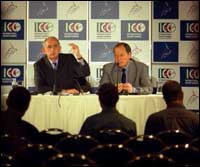ICC has got it right, for once
Daniel Laidlaw
It is not often one has cause to praise the International Cricket Council,
but the most heartening news for many years from cricket's governing body is
deserving of it. The introduction of a Test world championship is the best
thing to happen to cricket since the one-day game was created.
Given surprisingly little advance coverage for such a major change in
cricket structure, the Test world championship was announced at the recent
ICC board meeting in Melbourne. A 10-year programme, with each of the 10
Test nations playing the others home and away in an organised, co-ordinated
schedule, is long overdue.
Current scheduling is basically anarchy, with cricket boards all over the
world haphazardly arranging series to meet their needs as best they can. It
works, but is inefficient and unbalanced, with Australia playing England and
West Indies every two years while having met Zimbabwe just once in its
decade as a Test nation. Regulation by the ICC was just what was required.
With such an intense Test programme in place, restrictions may even be
placed on the proliferation of inconsequential one-day tournaments.
The championship itself is perfectly suited to Test cricket. A Test World
Cup similar to one-day cricket had been mooted, but would surely have proved
too unwieldy. It is impossible for 10 nations to play each other in anything
like a condensed tournament and such a World Cup, which would only have
proved which team was the best over that period of time, would also have
reduced the importance of the rest of the Test calendar, like the many
one-day tournaments compared the one-day World Cup.
 No, the ICC has got it just right, for once. A rolling championship, like
tennis rankings, will reward the best and most consistent. Fans will know
exactly where their team stands, what it has to do to move up, and what
needs to happen to improve. Imagine the series between Australia and South
Africa next season being played to decide the official world champion,
instead of the winning team only claiming to be the best and having its
merits debated among fans? What new dimensions each series will hold! Like
India, for example, knowing it can knock Australia out of the No. 1 position
with a series victory and, say, move ahead of Pakistan in the world
standings in the process.
No, the ICC has got it just right, for once. A rolling championship, like
tennis rankings, will reward the best and most consistent. Fans will know
exactly where their team stands, what it has to do to move up, and what
needs to happen to improve. Imagine the series between Australia and South
Africa next season being played to decide the official world champion,
instead of the winning team only claiming to be the best and having its
merits debated among fans? What new dimensions each series will hold! Like
India, for example, knowing it can knock Australia out of the No. 1 position
with a series victory and, say, move ahead of Pakistan in the world
standings in the process.
A perpetual rankings system is perfect for the sport, finally making it a
structured world league. It can only enhance Test cricket’s status. Series
as they stand now are in no way diminished, while there is the added
interest of world ranking at stake. Zimbabwe and Bangladesh can battle for
the wooden spoon, the middle tier can jostle for higher position, and the
top few can battle for the honour of being ranked No.1.
The best part is that it is fair to all nations, with powerful countries
forced to host the minnows on a regular basis, which can only improve the
standard of cricket worldwide as lesser teams gain greater competition and
in turn move up in the world order.
The formula appears simple enough, as the rankings will be based on the
results of the most recent series between each of the teams, at home and
away, with each series replacing the previous equivalent. Two points are
awarded for winning a series and one point for a drawn rubber.
One drawback is that individual Test results are not taken into account. For
example, a team that wins a series 5-0 receives the same number of points as
a team that wins a series 3-2 or even 1-0. At least the major reward is
placed on winning the series, so a drawn rubber to retain a trophy or save
face is not as productive as winning.
There may be some initial anomalies, since the ranking system, having to
start somewhere, is based on results from the last five years. It comes into
effect on May 1 for the series between England and Pakistan. Given time,
however, there is no reason why the system won't be an accurate reflection
of the standing of all teams.
All countries will play each other twice, home and away, over a five-year
period in a series of at least two matches. Two Tests barely qualifies as a
series, but it is better than the occasional one-Test "series" seen today.
This is likely to mean that leading countries will host the likes of
Bangladesh and Zimbabwe for a two-Test series during their off-season once
every five years, while retaining the lucrative five-match series against
traditional opponents on the current four-year cycle. These extra matches
out of season also present an opportunity to spread Test cricket away from
its traditional centres and, possibly, indoors at venues such as Melbourne’s
Colonial stadium.
Finally, authorities are thinking about the future of the game and putting
practical ideas in place to improve it. If the match-fixing scandal has
played some part in waking people up and prompting a re-assessment, then
perhaps some tiny measure of good can be derived from it.
You can also read:
ICC announce league table for Test supremacy
Mail Daniel Laidlaw